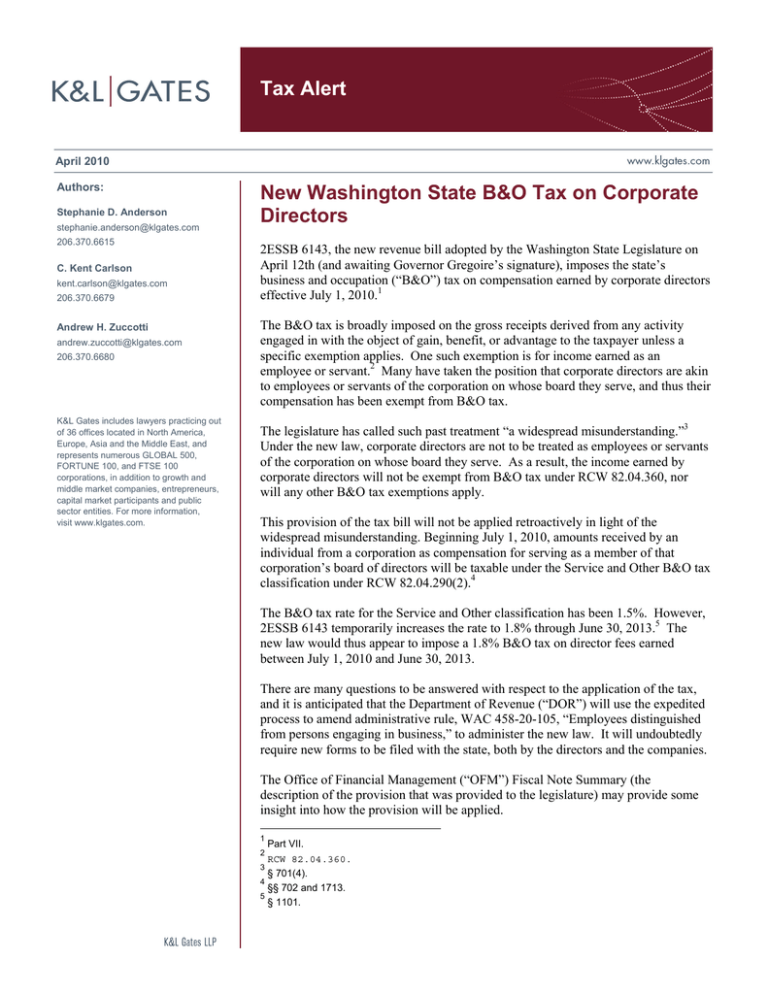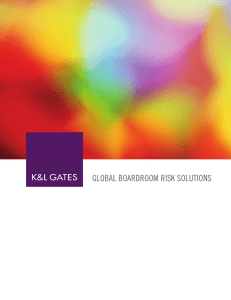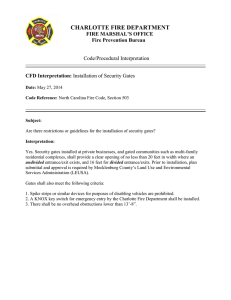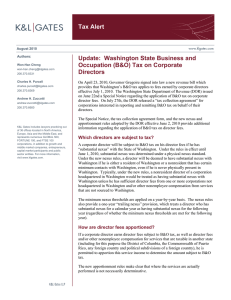
Tax Alert
April 2010
Authors:
Stephanie D. Anderson
stephanie.anderson@klgates.com
206.370.6615
C. Kent Carlson
kent.carlson@klgates.com
206.370.6679
Andrew H. Zuccotti
andrew.zuccotti@klgates.com
206.370.6680
K&L Gates includes lawyers practicing out
of 36 offices located in North America,
Europe, Asia and the Middle East, and
represents numerous GLOBAL 500,
FORTUNE 100, and FTSE 100
corporations, in addition to growth and
middle market companies, entrepreneurs,
capital market participants and public
sector entities. For more information,
visit www.klgates.com.
New Washington State B&O Tax on Corporate
Directors
2ESSB 6143, the new revenue bill adopted by the Washington State Legislature on
April 12th (and awaiting Governor Gregoire’s signature), imposes the state’s
business and occupation (“B&O”) tax on compensation earned by corporate directors
effective July 1, 2010.1
The B&O tax is broadly imposed on the gross receipts derived from any activity
engaged in with the object of gain, benefit, or advantage to the taxpayer unless a
specific exemption applies. One such exemption is for income earned as an
employee or servant.2 Many have taken the position that corporate directors are akin
to employees or servants of the corporation on whose board they serve, and thus their
compensation has been exempt from B&O tax.
The legislature has called such past treatment “a widespread misunderstanding.”3
Under the new law, corporate directors are not to be treated as employees or servants
of the corporation on whose board they serve. As a result, the income earned by
corporate directors will not be exempt from B&O tax under RCW 82.04.360, nor
will any other B&O tax exemptions apply.
This provision of the tax bill will not be applied retroactively in light of the
widespread misunderstanding. Beginning July 1, 2010, amounts received by an
individual from a corporation as compensation for serving as a member of that
corporation’s board of directors will be taxable under the Service and Other B&O tax
classification under RCW 82.04.290(2).4
The B&O tax rate for the Service and Other classification has been 1.5%. However,
2ESSB 6143 temporarily increases the rate to 1.8% through June 30, 2013.5 The
new law would thus appear to impose a 1.8% B&O tax on director fees earned
between July 1, 2010 and June 30, 2013.
There are many questions to be answered with respect to the application of the tax,
and it is anticipated that the Department of Revenue (“DOR”) will use the expedited
process to amend administrative rule, WAC 458-20-105, “Employees distinguished
from persons engaging in business,” to administer the new law. It will undoubtedly
require new forms to be filed with the state, both by the directors and the companies.
The Office of Financial Management (“OFM”) Fiscal Note Summary (the
description of the provision that was provided to the legislature) may provide some
insight into how the provision will be applied.
1
Part VII.
RCW 82.04.360.
3
§ 701(4).
4
§§ 702 and 1713.
5
§ 1101.
2
Tax Alert
First, the OFM assumed that the tax will be imposed
on corporate directors' fees paid by corporations
based or headquartered in Washington. This
assumption may mean that fees received by a
director from a corporation based or headquartered
outside Washington are not subject to the tax, even
though the director is a resident of Washington.
The OFM estimated that there are 200 Washingtonbased firms that are publicly traded and 100 nonpublicly traded firms with compensated directors. It
is unclear from the Fiscal Note Summary whether
the non-publicly traded firms are also based in
Washington; however, because the data sources are
from the DOR and Secretary of State’s Office, it is
likely that the non-publicly traded firms are based in
Washington. This consideration of only Washington
firms reinforces the idea that maybe the tax will only
be imposed on compensation received by a director
of a Washington-based or headquartered firm.
However, a basic concept of the B&O tax is its
application to gross receipts derived from activity in
Washington. Accordingly, it may well be that the
DOR rules will apply the B&O tax to director
services performed in Washington (e.g., Washington
residents or meetings in Washington) even though
the corporation is not based or headquartered here.
Second, the OFM assumed that all director activities
will be performed in Washington and therefore no
apportionment applies. Presumably, if the director
activities were performed in Washington and
another state, then the director would be entitled to
apportion the compensation under RCW 82.04.460
and WAC 458-20-194. There are a large number of
unanswered questions in this regard: e.g., where are
director services performed, where are the board
meetings held, where the corporation is based,
where the director lives, some combination of these;
further, are reimbursements part of the taxable fees?
Third, the OFM assumed that there are ten directors
per firm and that the average annual director
compensation is $61,000 per year. With respect to
this last assumption, the OFM summary notes, “A
large portion of director compensation is based
upon stock options and cannot be estimated due to
market volatility.” This appears to indicate that
stock options will be treated as compensation and
thus subject to the B&O tax. Exactly how options
will be valued is another unanswered question. It is
possible that the federal income tax treatment of
nonqualified options will be followed by the DOR.
Unfortunately, there is no current guidance.
Finally, some limited liability companies have
boards of directors. It appears the new B&O tax
literally does not apply to compensation, if any,
earned by directors for serving on the boards of
limited liability companies.
Circular 230 Disclosure: To ensure compliance with requirements
imposed by the IRS, we inform you that any U.S. federal tax advice
contained in this communication (including any attachments) is not
intended or written to be used, and cannot be used, for the purpose
of (i) avoiding penalties under the Internal Revenue Code or (ii)
promoting, marketing, or recommending to another party any
transaction or matter addressed herein.
Anchorage Austin Beijing Berlin Boston Charlotte Chicago Dallas Dubai Fort Worth Frankfurt Harrisburg Hong Kong London
Los Angeles Miami Moscow Newark New York Orange County Palo Alto Paris Pittsburgh Portland Raleigh Research Triangle Park
San Diego San Francisco Seattle Shanghai Singapore Spokane/Coeur d’Alene Taipei Tokyo Warsaw
Washington, D.C.
K&L Gates includes lawyers practicing out of 36 offices located in North America, Europe, Asia and the Middle East, and represents numerous
GLOBAL 500, FORTUNE 100, and FTSE 100 corporations, in addition to growth and middle market companies, entrepreneurs, capital market
participants and public sector entities. For more information, visit www.klgates.com.
K&L Gates is comprised of multiple affiliated entities: a limited liability partnership with the full name K&L Gates LLP qualified in Delaware and
maintaining offices throughout the United States, in Berlin and Frankfurt, Germany, in Beijing (K&L Gates LLP Beijing Representative Office), in
Dubai, U.A.E., in Shanghai (K&L Gates LLP Shanghai Representative Office), in Tokyo, and in Singapore; a limited liability partnership (also named
K&L Gates LLP) incorporated in England and maintaining offices in London and Paris; a Taiwan general partnership (K&L Gates) maintaining an
office in Taipei; a Hong Kong general partnership (K&L Gates, Solicitors) maintaining an office in Hong Kong; a Polish limited partnership (K&L
Gates Jamka sp. k.) maintaining an office in Warsaw; and a Delaware limited liability company (K&L Gates Holdings, LLC) maintaining an office in
Moscow. K&L Gates maintains appropriate registrations in the jurisdictions in which its offices are located. A list of the partners or members in each
entity is available for inspection at any K&L Gates office.
This publication is for informational purposes and does not contain or convey legal advice. The information herein should not be used or relied upon
in regard to any particular facts or circumstances without first consulting a lawyer.
©2010 K&L Gates LLP. All Rights Reserved.
April 2010
2






